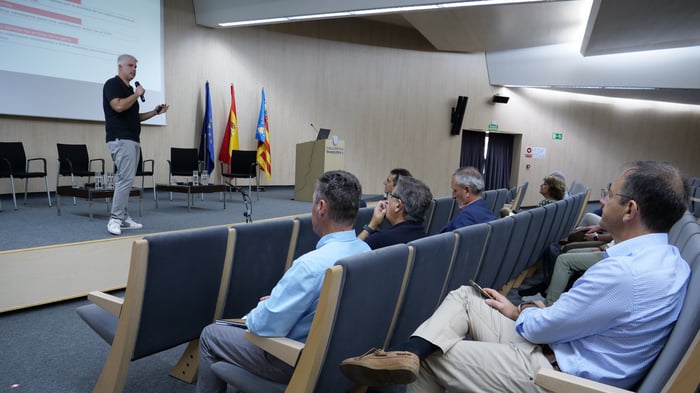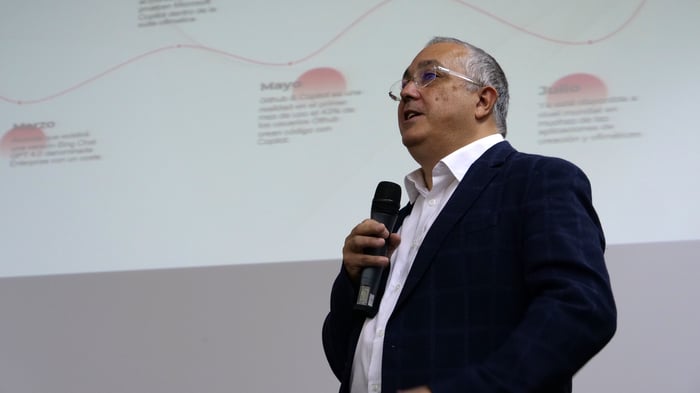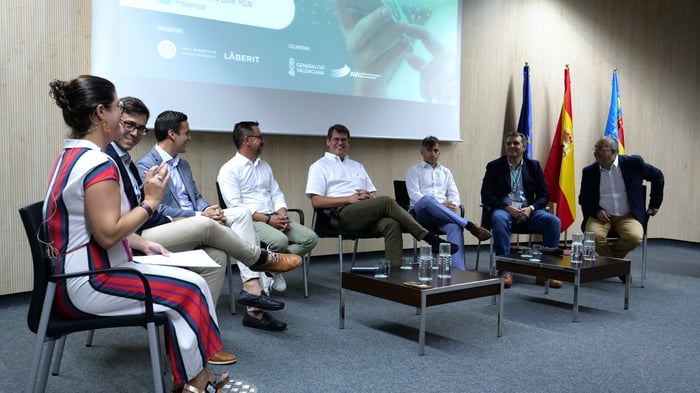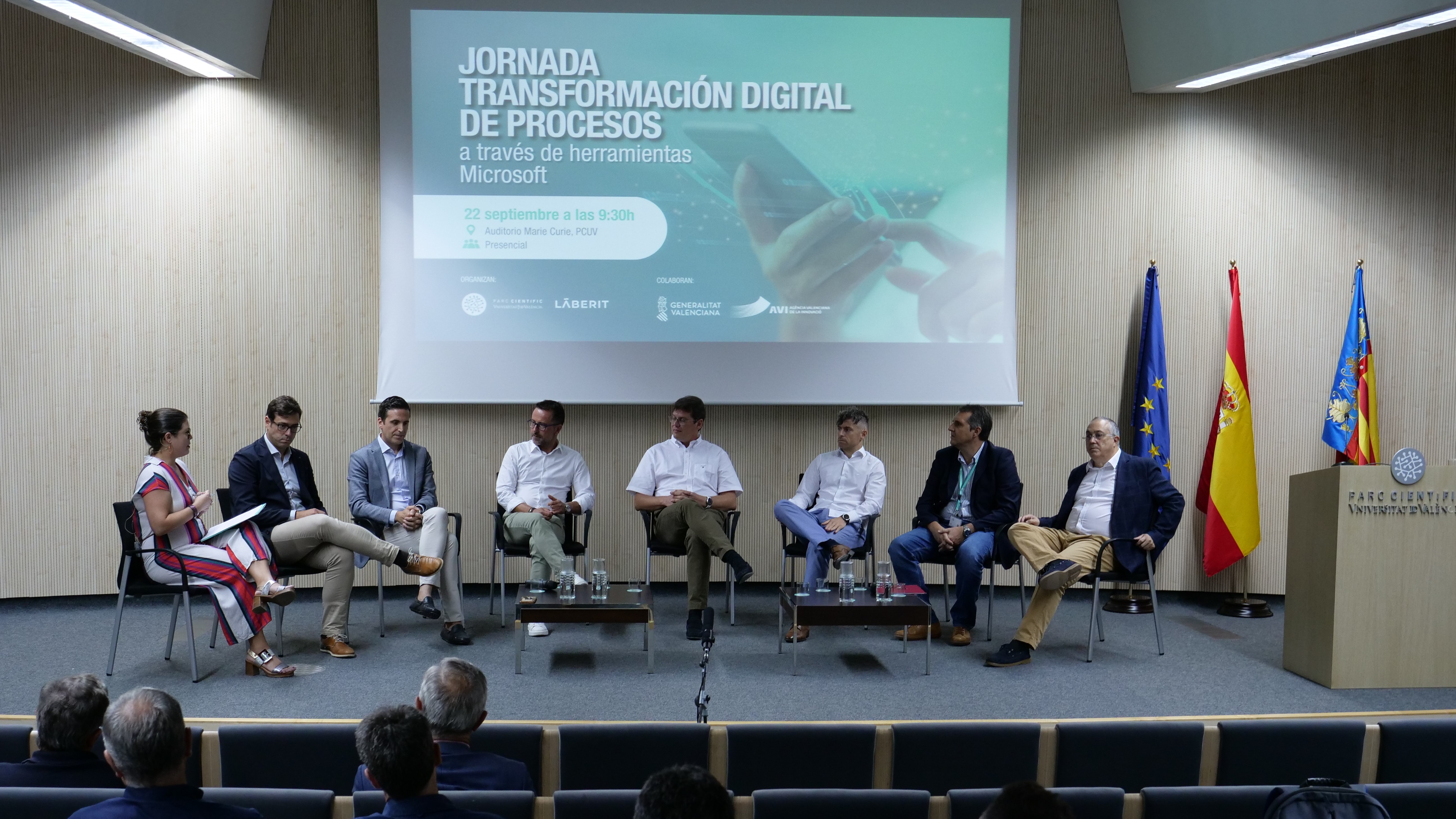The University of Valencia Science Park Foundation (FPCUV) organized an event at the Marie Curie Auditorium of the Science Park to present the tools that collaborate in business management, along with successful cases of implementation and implementation of innovative solutions aimed at the digitization of processes in organizations
The conference Digital transformation of processes through Microsoft tools, which was held on September 22 at the Marie Curie Auditorium of the University of Valencia Science Park (PCUV), brought together various professionals in digitization with the aim of addressing the keys to successful digital transformation processes in organizations. The event counted on the collaboration of Lãberit as a Microsoft technology partner, and with the support of the Valencian Innovation Agency (AVI).
This event, aimed at those responsible for carrying out the change towards digitization in organizations, focused on the process by which companies transform their operating model, their value proposition and their relationship with the customer with the support of technology and the momentum of the people who compose it. This change offers a series of advantages to companies, such as: improved relations with suppliers, innovation in products and services, greater agility in responding to the market, cost reduction, increased productivity and elimination of waste. The advantages of cloud computing solutions, especially Microsoft Dynamics CRM and Microsoft Business Central ERP, were also discussed during the conference.
"Organizations that think that it is not necessary to improve or change suffer from 'a syndrome' that will make that company sooner or later go wrong," Francisco Javier Félix, consultant at Lãberit.
In this sense, Francisco Javier Félix, consultant at Lãberit, focused his presentation: The importance of the flexibility of an Enterprise Resource Planning (ERP) for its adaptation to changing environments in aspects such as new regulations on the regulation of plastic; new businesses, such as the marketplace -B2B, new processes, as is the case of ISO 9001 - 14001, and the importance of new risks that arise in organizations, as is the case of the rupture of the supply chain.
To address these points, the Lãberit consultant emphasized "change". As he explained, all companies have to change and adapt. In fact, he pointed out that "the only sure thing in life is change. You have to adapt. In this sense, Francisco Javier Félix considered that organizations that think that it is not necessary to improve or change suffer "a syndrome" that will make that company "sooner or later go wrong." He also commented that there are two factors that cause companies to change: legal factors and process improvements.
Thus, the consultant in Lãberit gave several examples of companies that had to change due to the entry into force of the excise tax on non-reusable plastic packaging (IEEPNR). Although he also pointed out that changes in companies "are often not because they are imposed, but because of the nature of the organization". In this line, he commented on the case of a company that avoided passing on to its customers the cost increase caused by the IEEPNR through better suppliers who were able to supply a product of the same quality, but with a 35% reduction of non-recycled plastic.

Francisco Javier Félix, consultant at Lãberit during his presentation The importance of ERP flexibility in adapting to changing environments. PHOTO: FPCUV
In addition, Francisco Javier Félix recommended that "when looking for an ERP, it does not have to be the best in the system," but that the organization should consider that it should be "a flexible ERP, not only in terms of adaptation," but also in terms of "the network of partners in your territory" that the ERP has. With regard to Process Improvement, the Lãberit consultant advocated ISO Management, a solution that allows ISO9001 - 14001 certifications to be managed. In this regard, he pointed out that "ISO9001 is extremely important" because it ensures that "our companies have a high enough quality to compete with any opponent."
As for marketplace platforms, such as Amazon, he stressed that any organization that has one "is going to help products and services that were normally focused on the nearest commercial network to become a global product and service." "In the end, we have to adapt to these large multinationals, which force us to get up to speed and work harder. That is why the solutions we are implementing are increasingly moving in the direction of e-commerce," he added.
Marketing through CRM and use of AI
The second presentation of the day, entitled: Management of sales and marketing processes through Client Relationship Management (CRM). Use of AI in the relationship with customers, in which Julian Lorenzo, director of relations with the Microsoft Alliance, addressed various points such as conversational analysis, content generation, predictions in sales and marketing process automation.
"In recent years there has been a paradigm shift, especially with regard to online sales," and according to Lorenzo, "engaging customers is fundamental." Along these lines, he gave a presentation in which he combined the field of sales with current trends, such as artificial intelligence, which, although he indicated that "it has been with us for years," is currently "a more mature technology with moments of boom, where Spanish universities have had relevance thanks to the large number of natural language departments in almost all of them."
Likewise, the director of relations with the Microsoft Alliance emphasized the artificial intelligence algorithm that Microsoft will make available to the user, called Azure OpenAI, and will be available in all products of the brand. In this sense, Microsoft also introduces tools such as copilot "with the aim that each company has its own and not a general one", and through processes of injection of the information generated by each organization this will benefit from "own algorithms". On the other hand, Lorenzo presented some current examples of the use of artificial intelligence, such as the case of facilitating international relations through automatic translation, more precise medical diagnosis systems or autonomous driving systems.

"This technology is very good, it brings us a lot of value, but we cannot forget that behind AI there is an algorithm with training and work of many engineers, however, it does not stop giving a unique answer to a proposal. Therefore, we have to be observant. It is a co-pilot, an assistant", Julián Lorenzo, director of relations with the Microsoft Alliance
Successful cases
To exemplify the information provided in the presentations of the day and to end it, representatives of Lãberit, FPCUV, Inndromeda, the Instituto Tecnológico de Informática, Electrogrup and Escola Camp Joliu put on the table Successful cases of digitization of processes. At this point, three pillars were highlighted by the participants. Throughout their speeches, they highlighted the value of business, technology and culture, but not forgetting the need to present a planned and orderly digitization process. All this, without losing sight of the current state of digitization in the Valencian Community.
Francisco Ricau, head of the area of Strategic Information and Business Innovation at ITI - Instituto Tecnológico de Informática, stressed that the Valencian Community is in the Spanish average of digitization, although in the field of companies he warned that "there is a very uneven degree, especially motivated not so much by the sector, but by the size". "We have large companies that are not only leaders in their sector, but that bet on digitization and are now in very mature stages and are facing very important challenges, and yet we have small and medium-sized companies where progress is being made, but they still have a way to go," said Ricau.
 From left to right: Kristin Suleng, head of Communications and Marketing at Parc Científic Universitat de València (PCUV); Óscar David Sánchez, director of Inndromeda; Francisco Ricau, head of Strategic Information and Business Innovation at ITI - Instituto Tecnológico de Informática; Ernest Egea, director of Communications at Escola Camp Joliu; Luis Cortés and Mariano Serra, responsible for the Economic-Financial Area and ICT respectively at Fundació Parc Científic Universitat de València; and Julián Lorenzo, director of relations with the Microsoft Alliance at Lãberit. Photo: FPCUV
From left to right: Kristin Suleng, head of Communications and Marketing at Parc Científic Universitat de València (PCUV); Óscar David Sánchez, director of Inndromeda; Francisco Ricau, head of Strategic Information and Business Innovation at ITI - Instituto Tecnológico de Informática; Ernest Egea, director of Communications at Escola Camp Joliu; Luis Cortés and Mariano Serra, responsible for the Economic-Financial Area and ICT respectively at Fundació Parc Científic Universitat de València; and Julián Lorenzo, director of relations with the Microsoft Alliance at Lãberit. Photo: FPCUV
Thus, Juan José Miralles, manager of Electrogrup Generadores y Grúas Miralles, S.L., commented that for some years his company has been "committed to the implementation of technologies", in addition to working with Lãberit and Microsoft. He also pointed out that "as the company grew, you digitize with the options we had at that time", but, he added, "you reach certain turnover volumes and you set yourself certain objectives that, if you are not prepared, can overwhelm you". In fact, Miralles stressed that they are "very surprised", because in 2022 they had a growth of over 70%. "Having Business Central implemented has allowed us to take on this increase in work," he concluded.
"We have large companies that are not only leaders in their sector, but that have made a commitment to digitalization and are now in very mature stages and are facing very important challenges, and yet we have small and medium-sized companies that are making progress, but still have a long way to go", Francisco Ricau, head of Strategic Information and Business Innovation at ITI - Instituto Tecnológico de Informática
"The challenge we now face is that the fifteen people of the Foundation work against an integrated system, because we have reached 2023 with office solutions that have been solving the solutions of our areas, and the time has come to be more efficient. We have a greater capacity to take advantage of internal resources, we will connect better with the client, with the users, we will have a single data and traceability", Luis Cortés, head of the Economic-Financial Area at the FPCUV
The combination of these solutions makes it possible to manage all the company's information by integrating and connecting it, increasing the efficiency of the organization and sharing data between the different areas. This integrated information system provides a global vision of the customer and offers a better customer experience.



